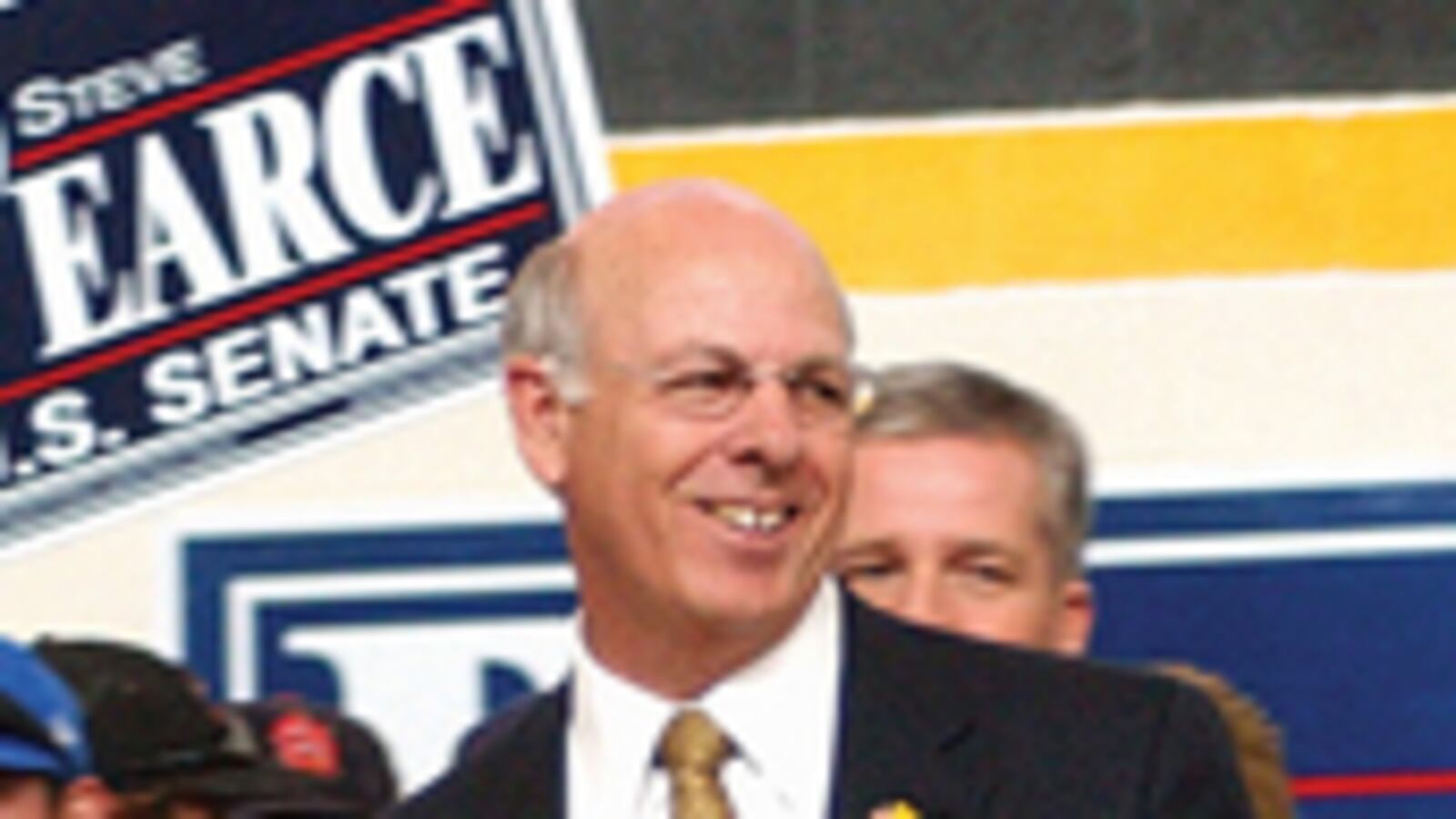
What do you call a 62-year-old Republican running for Congress?
This year? A “Young Gun.”
After this week’s primaries, the midterm elections have begun to find their form. Both major parties are trumpeting their efforts to recruit the sharpest, brightest—and yes, youngest—candidates to surf the anti-Establishment wave heading for Washington. For the National Republican Congressional Committee, this means coming up with a group of so-called Young Guns, a changing roster of candidates who represent, in the party’s eyes, a “new generation of conservative leaders.”
“The Republican Party has done a horrible job for decades of reaching out to young people,” said Jonathan Krohn, the 15-year-old conservative pundit. “It really has been the party of old white men.”
Thing is, the “new generation” isn’t actually all that young.
In fact, the current crop of the 22 Young Guns looks very much like the old generation of conservative leaders. These upstarts together average an age of 49.6 years old—two months shy of the average age of new members who joined Congress in 2008. And those current reps are no spring chickens themselves. According to one analysis, the 111th Congress is the oldest, on average, of any since 1907.
More than half of the Young Guns, having celebrated the big 5-0, are already eligible for an AARP membership. Only two of the group’s designated candidates—Martha Roby, who is running for Alabama’s 2nd District, and district attorney-cum-reality-television star Sean Duffy, who is running for the open seat in Wisconsin’s 7th District—are under the age of 40.
At 62, Steve Pearce is the most senior member of the group. The former congressman is hoping to win back his seat in New Mexico’s 2nd District—a job he left in 2008 to make an unsuccessful run for the Senate. But Pearce isn’t the only senior member of the Young Guns class; he’s got 59-year-old Richard Hanna of New York and 57-year-old Steve Chabot of Ohio nipping at his heels.
At least one member of the graying group has noticed the irony.
“I’m pleasantly amused that a gray-haired, 49-year old, and retired 22-year Army combat veteran is referred to as a Young Gun,” Allen West told supporters in Florida’s 22nd District. “As they say, you are only as young as you feel…”
Jonathan Krohn, the 15-year-old conservative pundit and author, said that the Republicans are wise to stick with guns that have been firing for a while.
“The Republican Party is trying to make sure that when they get young guns, they don’t get naïve guns. They want to try to stay with guys who have been in the game for a while,” Krohn said.
Still, even Krohn—one of conservatism’s freshest faces—had a word of caution for his party’s elders.
“The Republican Party has done a horrible job for decades of reaching out to young people,” Krohn said. “It really has been the party of old white men. It is not what we want to be, and it is not what we will be in the future.”
• Tunku Varadarajan: Nikki Haley and the South’s New Ethnic Power• Linda Hirshman: Fiorina Is Bad for WomenThe program got its start in 2008 under the initiative of Virginia Rep. Eric Cantor, California Rep. Kevin McCarthy, and Wisconsin Rep. Paul Ryan. Of the five Republicans who knocked off incumbent Democrats that year, four were designated “Young Guns.” The effort is designed to help candidates set goals and manage their campaigns—and membership has its privileges; the Young Guns get a higher profile within the party, which can only help when it comes time to ask the faithful to pony up the campaign cash. The program has already taken one hit this year for the high-profile loss of Vaughn Ward in the Idaho 1st District Republican primary. Some have questioned whether the program pushes newbies into high-pressure races before they’re ready.
An official from the Democratic Congressional Campaign Committee told The Daily Beast that there were at least three candidates challenging Republican incumbents who are under 35, but their preferred candidate group—“Frontline Democrats”—make no pretensions about youth.
That’s not to say the Republican Party hasn’t fielded any genuinely young candidates for congressional races this fall. Rep. Charles Djou, 39, of Hawaii was just elected to succeed the septuagenarian Democrat Neil Abercrombie, who retired to run for the governor’s mansion in Honolulu. Rep. Aaron Schock, of Illinois, was elected to Congress in 2008 at the ripe age of 27. The NRCC’s John Randall said that there are almost 50 Republican candidates who are under 40 and are still running. That number includes five candidates under the age of 30.
But only two of those candidates born after the dawning of Disco have found their way into the elite ranks of the party’s Young Guns group.
Randall, the committee’s e-campaign director, said that age isn’t the key criteria for inclusion in the select group—even if its members are advertised as young.
“You don’t need to be under 40 or under 50,” Randall said. “We are looking for the next generation and the generation of ideas. That’s what the Young Guns embody.”
Then again, the demographics of the party suggest that the truly junior league might have a tough time winning elections anyway.
Since 2000, the average age of Republican voters has been creeping up toward 50. But there is at least one bright spot for Republicans among young voters: A 2009 Gallup poll found that though Republicans trail Democrats in all major age groups, the GOP performed best among members of Generation X (those aged 30 to 44). Republican scouts might be well served then by going out to find candidates who look more like the charismatic lumberjack Duffy than the bald-pated Pearce.
Correction: Hanna was initially misidentified as a candidate in New Jersey.
Samuel P. Jacobs is a staff reporter at The Daily Beast. He has also written for The Boston Globe, The New York Observer, and The New Republic Online.





